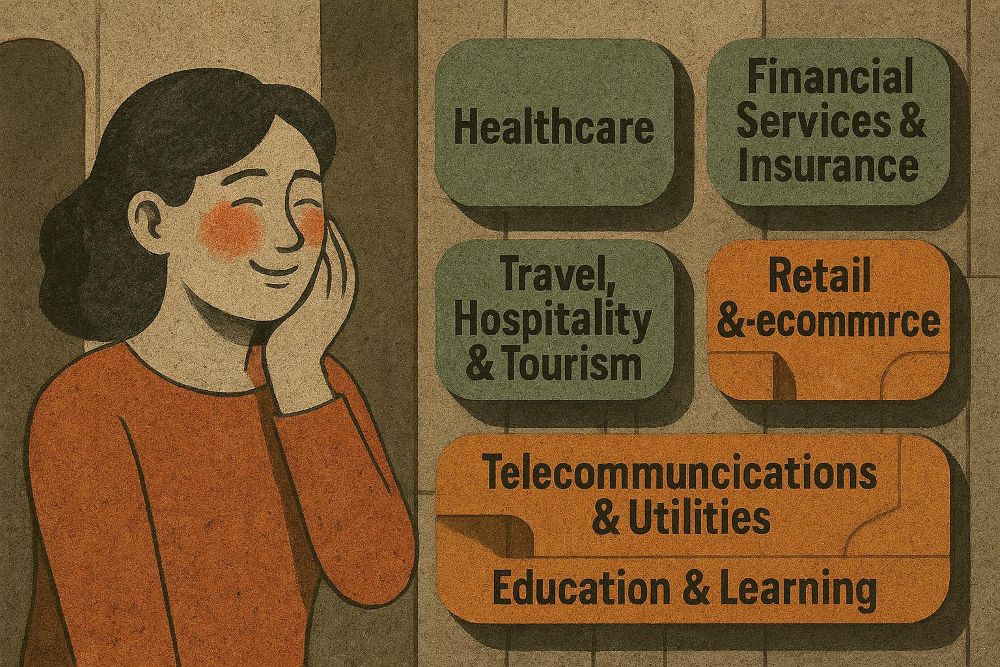When people think of conversational AI, the image that comes to mind is usually a chatbot answering simple FAQs or a voice assistant setting reminders. But that’s just the tip of the iceberg. Quietly, behind the scenes, conversational AI is being woven into industries that don’t make flashy headlines but affect millions of people every day.
From managing patient triage in hospitals to streamlining utility billing to helping students learn languages, these systems are reshaping how work gets done. The transformation isn’t loud — it’s incremental, practical, and often invisible to the end user. And that’s exactly what makes it so powerful.
In this article, we’ll look at six industries where conversational AI is quietly driving change — and why SaaS founders should pay close attention to these shifts.
Healthcare
Patient engagement and virtual triage
Hospitals and clinics are turning to conversational AI as their first line of interaction. Instead of waiting on hold or navigating clunky patient portals, individuals can chat with an AI system that guides them through symptoms, schedules appointments, or directs them to the right specialist. This not only improves the patient experience but also reduces bottlenecks for frontline staff.
Post-care follow-up and reminders
After discharge, patients often forget instructions or skip follow-ups. Conversational AI is closing this gap. Bots can send reminders for medication, upcoming tests, or follow-up visits, while also answering basic health questions. This reduces readmissions and helps providers extend care beyond the hospital walls without overwhelming nurses and doctors.
Automating administrative tasks
Behind the scenes, healthcare is loaded with repetitive tasks — billing inquiries, insurance verifications, record lookups. Conversational AI can automate many of these workflows, cutting down on errors and freeing up staff to focus on high-value work. For overburdened healthcare systems, this isn’t a “nice-to-have” — it’s becoming essential.
Financial Services & Insurance
Claims processing and policy servicing
Insurance claims have traditionally been paperwork-heavy and frustrating. Conversational AI is reducing that friction by guiding customers through claims filing, answering coverage questions, and providing real-time status updates. Instead of waiting days for a human response, users get instant clarity, while insurers save time and money on manual processing.
Personalized financial planning
Banks and fintech platforms are embedding AI-driven chat assistants that go beyond balance checks. They analyze spending habits, suggest budgeting strategies, and recommend financial products tailored to each customer. While these tools don’t replace licensed advisors, they serve as a first layer of guidance, making financial planning more accessible to everyday consumers.
Fraud detection and verification
Security is a top concern in financial services. Conversational AI is increasingly used to verify identities during high-risk transactions, detect anomalies in voice interactions, and flag suspicious activity. By blending real-time conversations with fraud detection systems, financial institutions can maintain trust while keeping user interactions seamless.
Travel, Hospitality & Tourism
Conversational booking and rebooking
From flights to hotel rooms, conversational AI is simplifying how travelers plan and modify trips. Instead of navigating complex booking portals, customers can simply ask a chatbot to find flights, suggest hotels, or change reservations. For businesses, this reduces cart abandonment and makes upselling far smoother.
Real-time disruption management
Travel disruptions — delays, cancellations, weather changes — often overwhelm call centers. Conversational AI steps in by sending proactive notifications, handling rebookings, and answering FAQs instantly. Airlines and hotels benefit from reduced customer frustration, while travelers gain a sense of control during stressful situations.
Personalized travel recommendations
With access to past travel behavior and preferences, AI-powered systems can suggest destinations, local tours, or even meal options through conversational interfaces. This kind of personalized guidance turns casual customers into loyal ones, giving hospitality brands a competitive edge.
Retail & E-commerce
Conversational commerce and upselling
Shopping is no longer confined to websites or apps — customers are discovering and buying products directly through conversational interfaces. AI assistants help them compare items, answer detailed product questions, and even recommend complementary products. This creates more natural upselling moments and increases average order value.
Omni-channel customer support
Today’s shoppers expect a seamless experience whether they’re on a website, mobile app, or messaging platform. Conversational AI unifies these channels, so a customer who starts a chat on WhatsApp can continue it later on the retailer’s site without losing context. The result: faster service and higher satisfaction.
Post-sale service automation
Returns, refunds, and order tracking are often pain points for customers. Conversational AI smooths out these processes by providing instant status updates, scheduling pickup logistics, and even automating refund approvals. This reduces customer frustration while lowering the support burden on staff.
Telecommunications & Utilities
AI-powered customer support
Telecom and utility providers handle huge volumes of repetitive support requests — billing questions, plan changes, service activations. Conversational AI handles much of this at scale, answering common queries instantly and routing complex issues to human agents. This frees up call centers to focus on higher-value interactions.
Outage updates and notifications
When there’s an outage, customers often flood support lines to ask “When will service be restored?” Conversational AI automates this process by pushing proactive notifications and providing real-time updates when users inquire. This reduces frustration and keeps customers informed without overwhelming staff.
Self-service account management
Customers increasingly prefer to manage services themselves. Conversational AI enables quick plan changes, add-ons, or usage checks through natural language. Instead of navigating confusing menus or waiting on hold, users get simple, fast self-service that improves satisfaction and loyalty.
Education & Learning
AI tutors and feedback bots
Conversational AI is becoming a silent teaching assistant. Students can ask questions, get step-by-step explanations, or receive instant feedback on assignments. In areas like language learning, chatbots simulate real conversations, giving learners a safe, always-available practice partner.
Administrative student support
Universities and schools deal with countless repetitive queries — from “When is the registration deadline?” to “How do I reset my portal password?” Conversational AI handles these tasks at scale, helping students find answers quickly without waiting in line or relying on limited office hours.
Personalized learning paths
Adaptive learning powered by AI is reshaping education. By analyzing student responses, conversational systems can adjust difficulty levels, recommend targeted exercises, and surface resources for weak areas. Instead of one-size-fits-all, learners receive a more tailored educational experience.
Why These Industries Are Ripe for Change
High volume of repetitive interactions
Industries like healthcare, retail, and telecom face millions of routine questions every day. Automating even a fraction of these interactions with conversational AI translates into massive time and cost savings — without sacrificing quality.
Regulatory and structured information flows
In finance, insurance, and healthcare, conversations often follow predictable patterns and strict compliance rules. This makes them especially well-suited for AI, which thrives in structured environments where accuracy and auditability are critical.
Customer expectations for immediacy
Across sectors, today’s customers expect fast, 24/7 responses. Conversational AI makes that possible without requiring companies to expand human teams endlessly. Meeting these expectations is no longer optional — it’s a baseline for staying competitive.
Scaling Conversational AI: Challenges to Overcome
Privacy, security, and compliance risks
Healthcare, finance, and education carry sensitive data. Any conversational AI solution must comply with HIPAA, GDPR, or local regulations while maintaining airtight security. A single slip can destroy customer trust.
Accuracy and contextual understanding
AI systems are powerful, but they’re not perfect. Misinterpreted queries or generic answers frustrate users quickly. The real challenge lies in building models that understand nuance, industry-specific language, and context.
Smooth human handover
No matter how advanced, AI can’t handle every scenario. A seamless handoff to a human agent is critical when the AI reaches its limits. Poorly designed escalation loops risk trapping customers, creating more frustration than the AI was meant to solve.
Takeaways for SaaS Founders
Embedding conversational AI as a differentiator
SaaS products that layer in conversational AI — whether for onboarding, customer support, or analytics — stand out in crowded markets. Even lightweight AI features can significantly boost user experience and retention.
Start small, scale smart
The most successful implementations begin with a narrow use case, like automating a single customer workflow. Once ROI is proven, founders can scale to more complex tasks and deeper integrations.
Opportunities in integrations and partnerships
Conversational AI rarely lives in isolation. The real value often comes from integrations with core industry tools — EHRs in healthcare, CRMs in finance, or LMSs in education. Founders who build flexible connectors and partnerships create long-term defensibility.
FAQs
1. What is conversational AI used for in healthcare?
Conversational AI in healthcare is used for patient triage, appointment scheduling, medication reminders, and automating administrative tasks like billing and insurance queries.
2. How does conversational AI improve customer service in banking?
It helps banks and insurers provide instant claim updates, verify identities, and offer personalized financial advice, reducing wait times and improving customer trust.
3. Which industries benefit the most from conversational AI?
Industries with high volumes of customer interactions — such as healthcare, finance, retail, telecom, travel, and education — see the biggest gains from conversational AI.
4. What are the main challenges of using conversational AI?
Key challenges include maintaining data privacy, ensuring accuracy in responses, providing contextual understanding, and enabling smooth escalation to human agents.
5. How can SaaS founders leverage conversational AI?
SaaS founders can integrate conversational AI into their platforms to improve onboarding, automate support, and create integrations with industry-specific systems, offering a competitive advantage.


